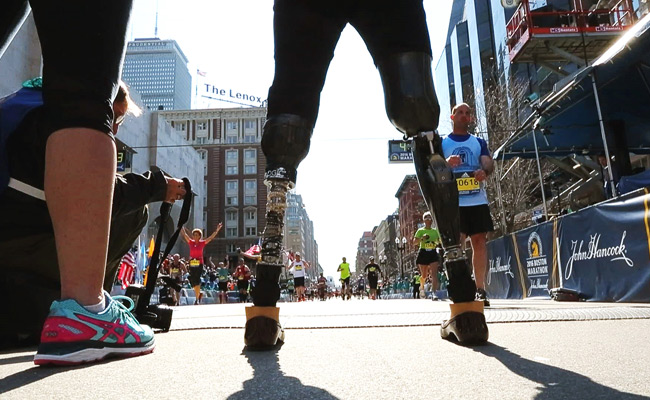Updated November 23:
THE MARATHON: PATRIOTS DAY BOMBING is now streaming on HBOGo
Ricki Stern and Annie Sundberg’s powerful documentary MARATHON: THE PATRIOTS DAY BOMBING recounts the dramatic story of the 2013 terrorist attack at the Boston Marathon through the emotional experiences of individuals whose lives were forever impacted. Following events from the moment of the attack to the sentencing of Dzhokhar Tsarnaev, the film features surveillance footage, news clips, home movies and interviews with survivors, their families, first responders, investigators, government officials and reporters from The Boston Globe, which won a Pulitzer Prize for its coverage of the bombing. Over the course of three years, the survivors face the challenges of physical and emotional recovery as they and their families strive to reclaim their lives and communities in the wake of terrorism.
MARATHON: THE PATRIOTS DAY BOMBING dives deep into a story with which most people are familiar, revealing the personal stories behind the headlines. What drew you to tell this particular story?
Ricki Stern & Annie Sundberg: We were meeting with Sheila Nevins and Nancy Abraham at HBO and discussing the aftermath of terrorist attacks when Sheila noted that the Boston bombing trial was not being reported as front page news. She started us thinking about the survivors and what happens when the media blitz disappears and people are left with the long-term pain and suffering.
As we talked further, sharing what we knew about the attacks in Boston, we all wondered what had happened to the survivors, the people who had simply been there that day. Sheila felt, and we agreed, that the outcome for these survivors, and the everyday heroes among them, was also a national story and one that hadn’t fully been told.
It can be tricky to find the right balance between observation and exploitation (which you did expertly). How did you establish the trust with your subjects that allowed them to be so candid?
Ricki Stern & Annie Sundberg: We spend a lot of time with our film subjects. We may spend hours on the phone or visit with them without cameras to get a sense of their stories. Understandably, the survivors were wary in the beginning, so we explored together what they would be comfortable revealing about their struggles, and slowly people opened up.
One thing we as filmmakers were concerned about was showing too much of the actual bombing and the carnage in its aftermath, but we were told by all the survivors how important it was to show the devastation the bombs caused. They wanted an audience to fully understand the impact of an IED on the body.
As we delved deeper into the survivors’ stories, it became apparent that the work to heal their physical and emotional injuries was just beginning. We were amazed and honored by how open they became with us in documenting their private challenges. For each of the survivors, there was a sense of giving back through the filmmaking process, of helping others to understand how best to support those who may come next.
At what point did you get involved? You have astonishing footage from the actual day of the bombing—was that difficult to secure?
Ricki Stern & Annie Sundberg: We started researching and filming in May 2015, and early on in the process we were struck by The Boston Globe’s depth of reporting and coverage of the Marathon bombings. We approached them for a partnership that allowed us to draw on their archive of material, and we also continued research with our own team.
When this event happened, there was also a tremendous amount of social media coverage, and we included material that was captured by people who happened to capture remarkable events with a smart phone. (The shootout in Watertown is one example.) Last, there was a trove of surveillance footage that came out during the trial in April 2015, which we were also able to incorporate into the film.
With a story like this—as with most documentaries—it can be tough to know when it’s “over.” How did you know when to end filming?
Ricki Stern & Annie Sundberg: We started with our editor Keiko Deguchi early in the process, so as we were going through footage we were shooting and capturing an unfolding story. We got to a point where we were able to map out the trajectory of each story to decide what we might need to end the personal stories, but the larger story is never-ending, because the survivors’ struggles continue today. In many ways we looked at the film as snapshots of a moment in time.
Ultimately, the end of the film happens to parallel the opening of the film. We conclude the film three years after the bombing, with the 2016 Boston Marathon, more by filmmaking chance than by anything we could ever have dreamed up. One of our main storytellers, who is an amputee due to the bombing, chose to run the marathon. It turned out to be an incredibly emotional scene, with all our main subjects at the finish line as we witnessed the threads of the film come together in this beautiful moment.
As seasoned documentarians, do you have one piece of advice for aspiring filmmakers?
Ricki Stern: Keep your passion for storytelling at the forefront of everything you do. I delivered packages for SNL at 2:00AM and secured parking spots at 5:00AM. Not every experience will feel meaningful, but if you can embrace the process and keep focused, eventually you will find yourself in a place to do the work you want to do.
Annie Sundberg: Watch films. There’s such an incredible history to the form, and understanding what has come before allows you to reference or break the mold in different ways as you move ahead in your own work. Also, learn a craft and you will always have a job when things get tough along the path to making your first films; editors are 99% employed, but first-time directors, not so much.
What do you think these families—and the resilient city of Boston—have to teach us? What would you like HIFF audiences to take away from your film?
Ricki Stern & Annie Sundberg: In sharing their experiences, our film subjects felt strongly about giving others who are facing similar pain, or who may in the future, the courage to fight in the face of unending setbacks, and the strength to allow themselves to feel hope. What the audience brings to it and takes away from it will inform what they think about as they leave the theater. As filmmakers, we learned so much from the survivors about resilience and grace.
You were at HIFF in 2008 with your film THE END OF AMERICA. What are you most looking forward to at HIFF 2016?
Ricki Stern & Annie Sundberg: The HIFF has amazing audiences—engaged, interested, activist audiences. We are excited for this world premiere moment at HIFF. In light of the recent attack in New York City—with its eerie similarities to what happened at the Marathon—we are thankful to have the opportunity to bring Boston survivors to the Hamptons International Film Festival audience. It will be the first time these survivors will experience the film with an audience, and we are looking forward to the Q&A. Their stories of struggle and perseverance will hopefully resonate with all audiences as we face the challenge of everyday terrorism.
Check out the World Premiere of MARATHON: THE PATRIOTS DAY BOMBING in the World Cinema Documentary section of HIFF 2016.






